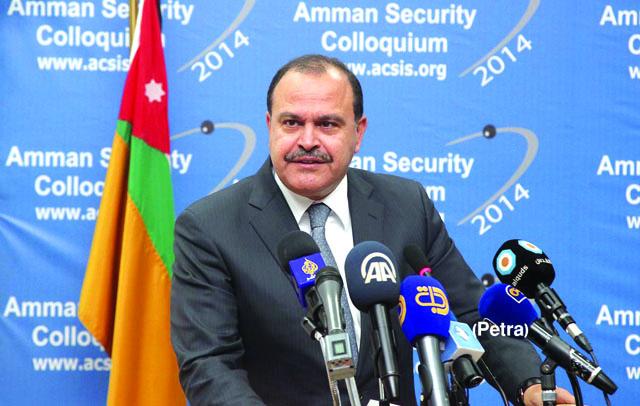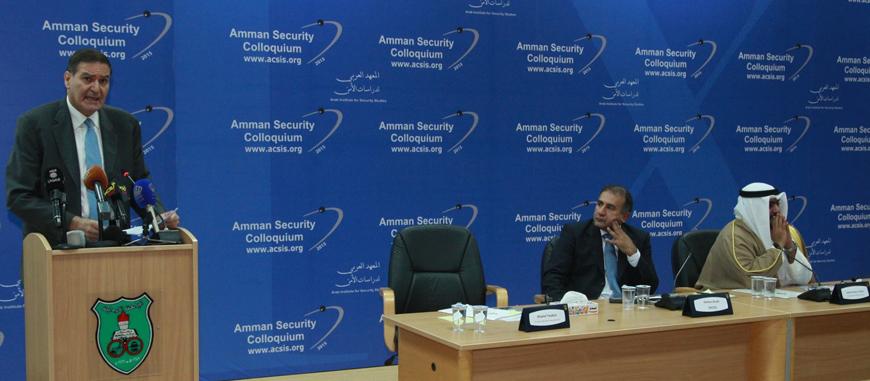You are here
‘Jordan committed to creating weapons of mass destruction free zone in region’
By Dana Al Emam - Nov 12,2014 - Last updated at Nov 12,2014

AMMAN — As the region’s instability and political complications linger, Jordan still believes in the importance of creating a weapons of mass destruction free zone (WMDFZ) in the region, Interior Minister Hussein Majali said Wednesday.
In his address at the seventh Amman Security Colloquium, Majali said the situation in the region is taking “a very dangerous twist that is casting its shadows across the globe”, citing the Israeli occupation as one of the root causes of the unrest.
He said the extended and amplified “volatile” reactions that the region is witnessing can only be resolved and abolished if the root causes are addressed.
“The radicalism, violence and extremism that are sweeping the region are manifestations attributed to economic, social and political factors,” Majali said at the conference, attended by some 150 high-level experts and decisions makers from 40 Arab and Western states at the University of Jordan.
The minister highlighted Jordan’s future vision of the region as “peaceful and safe”, noting that weapons of mass destruction (WMD), specifically nuclear weapons, are the world’s “greatest security threats”.
Organised by the Arab Institute for Security Studies in collaboration with a number of governments and international organisation, the two-day meeting is focusing on the challenges and opportunities to reach a WMDFZ with an emphasis on foreign policy options, regional cooperation, disarmament and nuclear non-proliferation, organisers said.
Speaking at a panel, Abdelmajid Mahjoub, director general of the Arab Atomic Energy Agency (AAEA), said the use of atomic energy in Arab countries has been “significantly increasing” over the last decade.
Mahjoub noted that Arab countries were able to benefit from atomic energy in healthcare, industrial quality assurance, agricultural development, water resources management, environmental protection and electricity generation.
He added that the AAEA plays a major role in helping these countries “develop the infrastructure and the needed capabilities for nuclear and radiological safety and security”.
Mahjoub called on countries with advanced nuclear technology to support the region in the acquisition and development of peaceful nuclear technology, stressing the need for “effective and independent regulatory bodies”.
He noted that the AAEA established the Arab Network of Nuclear Regulators, which includes thematic groups working on strengthening infrastructure and capacity building for regulatory bodies, in addition to creating laws and regulatory frameworks governing atomic technology.
“The network also takes [precautions] in case of atomic emergencies, in addition to its role in radioactive waste management,” Mahjoub told participants, highlighting its role in maintaining proliferation safety as well as sharing atomic information and technologies.
Angela Kane, high representative for disarmament affairs at the UN, said the existence of WMD creates “mistrust and mutual suspicion” among nations.
“[There is] plenty of evidence that such weapons are widely viewed in the world as abhorrent and deserving only the fate of abolition and total elimination,” she said, citing demands of people from all walks of life across the globe for disarmament.
Kane added that the utilisation of WMD in an unstable region creates a threat as they might spread and be used in the turmoil, highlighting the UN’s efforts to eliminate these weapons.
Kane pointed to an “uncertainty” when thinking of the future of WMD in the Middle East.
Slovak Deputy Prime Minister and Foreign Minister Miroslav Lajcak said the region is threatened by the Islamic State terrorist group and the consequences of the Arab Spring uprisings in Syria and Libya, in addition to Iran’s nuclear activities and the expansion of illegal Israeli settlements.
Lajcak praised Jordan as a model of moderation and stability, with constant attempts to achieve comprehensive political reform.
Ekmeleddin Ihsanoglu, former secretary-general of the Organisation of Islamic Cooperation, said in the past, the region’s people felt proud about sharing a common history.
But now they share no glory due to instability, economic difficulties, social unrest, terror and radicalism, ?hsano?lu noted, stressing the need to create a common future that puts an end to suffering.
He called for boosting economic cooperation across the region, underscoring the importance of developing a WMDFZ.
The Netherlands Ambassador to Jordan Paul van den IJssel highlighted the cooperation between Jordan and his country in security and combating terrorism, extremism and crime.
He added that the rise of radicalism in the region amplifies the need for disarmament.
The colloquium’s second day will include discussions on nuclear terrorism, security and proliferation, in addition to a panel discussion that analyses nuclear programmes in the Arab World.
Related Articles
AMMAN — International efforts to create a weapons of mass destruction free zone (WMDFZ) in the region must “avoid double standards and selec
The seventh Amman Security Colloquium is scheduled to convene at the University of Jordan on Wednesday with the participation of 150 high-level experts and decisions makers from 40 Arab and Western states, according to a statement from organisers.
AMMAN — Officials and representatives of international organisations on Wednesday discussed measures to reduce the use of nuclear weapons, a

Opinion
Apr 09, 2025
Apr 08, 2025
- Popular
- Rated
- Commented
Apr 08, 2025
Apr 09, 2025
Newsletter
Get top stories and blog posts emailed to you each day.















